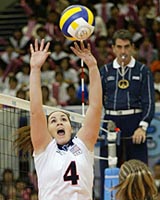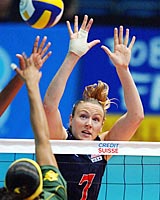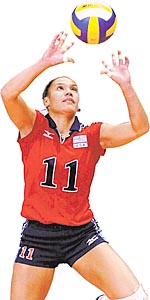Post by Noname on Aug 12, 2004 22:48:29 GMT -5
By Ann Miller
Advertiser Staff Writer
Without Hawai'i, the U.S. Olympic women's volleyball team would have great hitters with nothing to hit and a huge hole in the block. Hardly the second-ranked team in the world that goes into Athens thinking only of gold.
The 50th state is responsible for 25 percent of the team and 33 percent of the starters. That's not counting Logan Tom, who never lived here, but whose father, Mel, graduated from Maryknoll before playing in the NFL.
"Every time I go home all I hear about is volleyball," said Punahou and Minnesota graduate Lindsey Berg. "Not having professional sports in Hawai'i gives some smaller sports the opportunity to have a real impact on younger children's lives. It really has to do with how people love volleyball in Hawai'i."
Berg is the backup for U.S. setter Robyn Ah Mow-Santos, a McKinley graduate who returned fulltime to the national program in 1999. That was three years after the two-time All-American helped Hawai'i into the NCAA final.
The following January, Heather Bown made the dramatic leap from two-time Rainbow Wahine All-American to starting U.S. middle blocker in time to stand next to Ah Mow-Santos as the starters were introduced in Sydney.
Both have been intent on returning for what they left behind with their stunning run into the bronze medal match at the 2000 Games. They are among seven previous Olympians on this team.
"For Robyn and me it's the same thing," Bown said. "We want that medal that we lost in Sydney. It's a big driving point for everyone on the team. We have the talent and desire to win gold."
They are not the only ones who feel that way. Strangers have told them they are capable of winning it all in Athens, if they allow themselves to be themselves.
Rookies like Berg, who came in last year and started while Ah Mow-Santos worked her way back after giving birth, and Stanford's Ogonna Nnamani feel the fire — and fuel it.
"Ogonna tells us she's been watching tape of the best teams for years and we're the best players she's ever seen," Bown said. "She doesn't get yet that she is on this team. It's awesome to hear that from a player on your team. It's like a slap in your face."
Toshi Yoshida, U.S. head coach for this quadrennium, has painstakingly taken pieces of what he feels are the best parts of opponents' games and devised a unique system. It has given the Americans immense confidence. They are rarely out-matched.
Their losses have come when they failed to execute. "To be in that (perfect) zone is tough and tiring," Bown admitted, "but it's what you need to do to win gold."
The Olympics is all about execution, match after match. Particularly when the Americans open against top-ranked China on Saturday and their pool also includes Russia and Cuba, who played for the gold four years ago.
Ah Mow-Santos thrives against that type of challenge.
"She is so hard-nosed," UH coach Dave Shoji said. "The kind of person you like to have on your side in a fight. She just won't back down, not to anybody. That's what you've got to love about her. She is going to fight to the bitter end."
Bown finds much more emotion visible in Ah Mow-Santos' game since she gave birth to Jordan Nohili 18 months ago. She has patiently worked through the system and tempo changes, and Yoshida's meticulous demands, while keeping her cool in the eye of the volleyball storm.
Berg's role is to bring the storm to an upbeat end. She enters games late as "the closer," coming into the back row as part of a double substitution. A hitter goes in for Ah Mow-Santos to bolster the block and provide another weapon.
Berg, at her best, goes nuts. She has it down to such a science, and has worked so hard to stay with this team, that Yoshida cannot afford to keep her on the bench.
"She's like a wild child," Bown said. "That's her role. She needs to close out games — serve her jump serve, get sets and digs. Robyn runs the floor and keeps everybody sane and in system. They both do a fantastic job."
And have an extremely healthy relationship. Ah Mow-Santos never hesitates to ask Berg for help. Berg admits Ah Mow-Santos is one of her idols: "She has been amazing to me."
Shoji said he believes the setters' most valuable physical asset is simply their "feel for the game," after taking the game up early in life.
In contrast, Bown was a swimmer growing up. She discovered volleyball late, and Hawai'i even later, transferring here for her final two, remarkable, seasons. In Manoa she was a terminator and the country's best blocker.
On this team, she is a defensive force and, often, an offensive decoy. The only other differences in her game are a jump serve and four years of international experience. Bown still plays big, particularly in big matches.
They don't get any bigger than the Olympics.



Advertiser Staff Writer
Without Hawai'i, the U.S. Olympic women's volleyball team would have great hitters with nothing to hit and a huge hole in the block. Hardly the second-ranked team in the world that goes into Athens thinking only of gold.
The 50th state is responsible for 25 percent of the team and 33 percent of the starters. That's not counting Logan Tom, who never lived here, but whose father, Mel, graduated from Maryknoll before playing in the NFL.
"Every time I go home all I hear about is volleyball," said Punahou and Minnesota graduate Lindsey Berg. "Not having professional sports in Hawai'i gives some smaller sports the opportunity to have a real impact on younger children's lives. It really has to do with how people love volleyball in Hawai'i."
Berg is the backup for U.S. setter Robyn Ah Mow-Santos, a McKinley graduate who returned fulltime to the national program in 1999. That was three years after the two-time All-American helped Hawai'i into the NCAA final.
The following January, Heather Bown made the dramatic leap from two-time Rainbow Wahine All-American to starting U.S. middle blocker in time to stand next to Ah Mow-Santos as the starters were introduced in Sydney.
Both have been intent on returning for what they left behind with their stunning run into the bronze medal match at the 2000 Games. They are among seven previous Olympians on this team.
"For Robyn and me it's the same thing," Bown said. "We want that medal that we lost in Sydney. It's a big driving point for everyone on the team. We have the talent and desire to win gold."
They are not the only ones who feel that way. Strangers have told them they are capable of winning it all in Athens, if they allow themselves to be themselves.
Rookies like Berg, who came in last year and started while Ah Mow-Santos worked her way back after giving birth, and Stanford's Ogonna Nnamani feel the fire — and fuel it.
"Ogonna tells us she's been watching tape of the best teams for years and we're the best players she's ever seen," Bown said. "She doesn't get yet that she is on this team. It's awesome to hear that from a player on your team. It's like a slap in your face."
Toshi Yoshida, U.S. head coach for this quadrennium, has painstakingly taken pieces of what he feels are the best parts of opponents' games and devised a unique system. It has given the Americans immense confidence. They are rarely out-matched.
Their losses have come when they failed to execute. "To be in that (perfect) zone is tough and tiring," Bown admitted, "but it's what you need to do to win gold."
The Olympics is all about execution, match after match. Particularly when the Americans open against top-ranked China on Saturday and their pool also includes Russia and Cuba, who played for the gold four years ago.
Ah Mow-Santos thrives against that type of challenge.
"She is so hard-nosed," UH coach Dave Shoji said. "The kind of person you like to have on your side in a fight. She just won't back down, not to anybody. That's what you've got to love about her. She is going to fight to the bitter end."
Bown finds much more emotion visible in Ah Mow-Santos' game since she gave birth to Jordan Nohili 18 months ago. She has patiently worked through the system and tempo changes, and Yoshida's meticulous demands, while keeping her cool in the eye of the volleyball storm.
Berg's role is to bring the storm to an upbeat end. She enters games late as "the closer," coming into the back row as part of a double substitution. A hitter goes in for Ah Mow-Santos to bolster the block and provide another weapon.
Berg, at her best, goes nuts. She has it down to such a science, and has worked so hard to stay with this team, that Yoshida cannot afford to keep her on the bench.
"She's like a wild child," Bown said. "That's her role. She needs to close out games — serve her jump serve, get sets and digs. Robyn runs the floor and keeps everybody sane and in system. They both do a fantastic job."
And have an extremely healthy relationship. Ah Mow-Santos never hesitates to ask Berg for help. Berg admits Ah Mow-Santos is one of her idols: "She has been amazing to me."
Shoji said he believes the setters' most valuable physical asset is simply their "feel for the game," after taking the game up early in life.
In contrast, Bown was a swimmer growing up. She discovered volleyball late, and Hawai'i even later, transferring here for her final two, remarkable, seasons. In Manoa she was a terminator and the country's best blocker.
On this team, she is a defensive force and, often, an offensive decoy. The only other differences in her game are a jump serve and four years of international experience. Bown still plays big, particularly in big matches.
They don't get any bigger than the Olympics.







